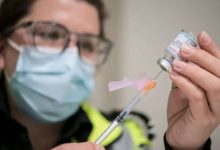Legal groups launch court application over sharing of COVID-19 test data with police

A group of Canadian organizations has launched a court application in Ontario Superior Court challenging the provincial government’s decision to share personal information with police about Ontarians who test positive for COVID-19.
In April, the province issued an emergency order allowing police, firefighters and paramedics to access what it called “critical information” about individuals confirmed to be infected.
According to the Canadian Civil Liberties Association (CCLA), at the time of the order, Ontario’s privacy commissioner objected to the move, but the regulation was passed despite the province being unable to demonstrate it was necessary for public safety.
Abby Deshman, Director of the Criminal Justice Program with the CCLA, says health information is among the most sensitive personal information the government holds.
“Given the patchy nature of COVID testing and the risk of asymptomatic spread, police — like the rest of the population — need to be taking universal precautions to prevent the spread of COVID,” Deshman said in a news release.
“Sharing COVID test results with police is not necessary, and in fact undermines an effective public health approach to this pandemic,” she added.
Under the Emergency Management and Civil Protection Act, first responders are allowed to obtain the names, addresses, and dates of birth of Ontarians who had tested positive for COVID-19.
The move was meant “to protect Ontario’s first responders and stop the spread of COVID-19,” the province said in a news release issued on April 6.
“Strict protocols will be enforced to limit access to this information and will only be used to allow first responders to take appropriate safety precautions to protect themselves and the communities they serve,” the release said, adding that first responders would no longer have access to the data after the emergency declaration is lifted.
CBC News is seeking comment from the province about the legal challenge.
Privacy concerns
Aboriginal Legal Services (ALS), the Black Legal Action Centre (BLAC), the HIV & AIDS Legal Clinic Ontario (HALCO) and the CCLA all say the government’s decision to release this information to police breaches provincial health privacy protections and violates individuals’ constitutional rights to privacy and equality.
The legal challenge also argues the measure is not authorized by Ontario’s emergency legislation.
ALS lawyer Caitlyn Kasper said in a news release that police have historically been “weaponized” against Indigenous society and healthcare, which has resulted in significant health disparities and a lack of trust for police.
“As a result, the provision of sensitive personal health information to police unnecessarily deters Indigenous people from accessing essential services, such as timely, confidential healthcare. This then places the health of Indigenous people and the broader community at risk,” Kasper said in a statement.
Ruth Goba, Executive Director of BLAC, pointed to a strained relationship between police and Black Ontarians given their history of carding, a practice which was used to collect personal information in the community until 2017, when it was banned.
“The fact that personal health information is now being needlessly shared with the police is deeply concerning to Black communities across the province,” she said in a statement.
Khalid Janmohamed, HALCO staff lawyer, said in a news release people are less likely to get tested or seek treatment for COVID-19 because they are afraid of being targeted by police.
The groups say they wrote to Ontario’s Solicitor General on April 22, outlining their concerns with the government’s decision to share sensitive personal health information with police.
To date, no response has been received, according the CCLA.
CBC








Redes Sociais - Comentários